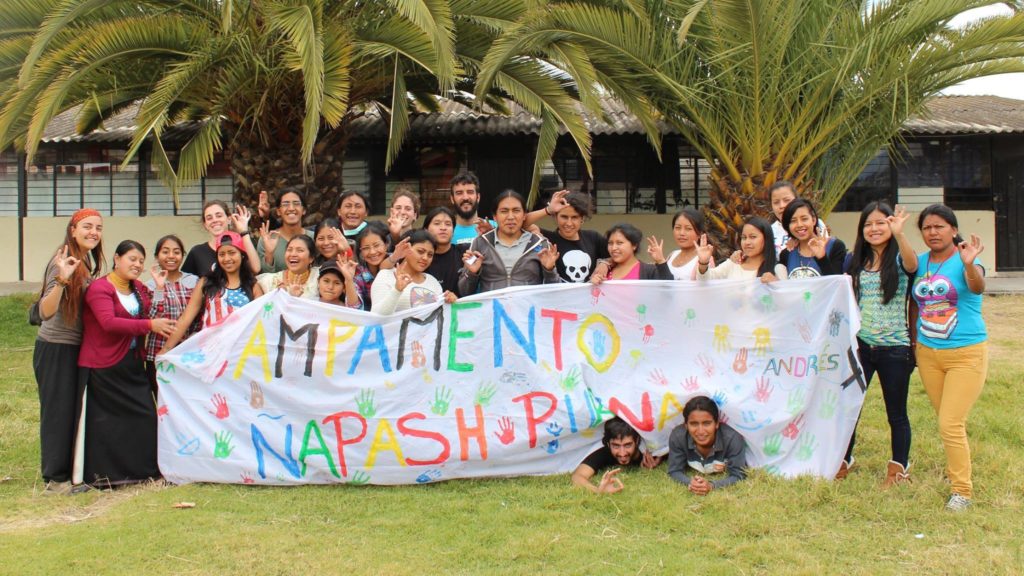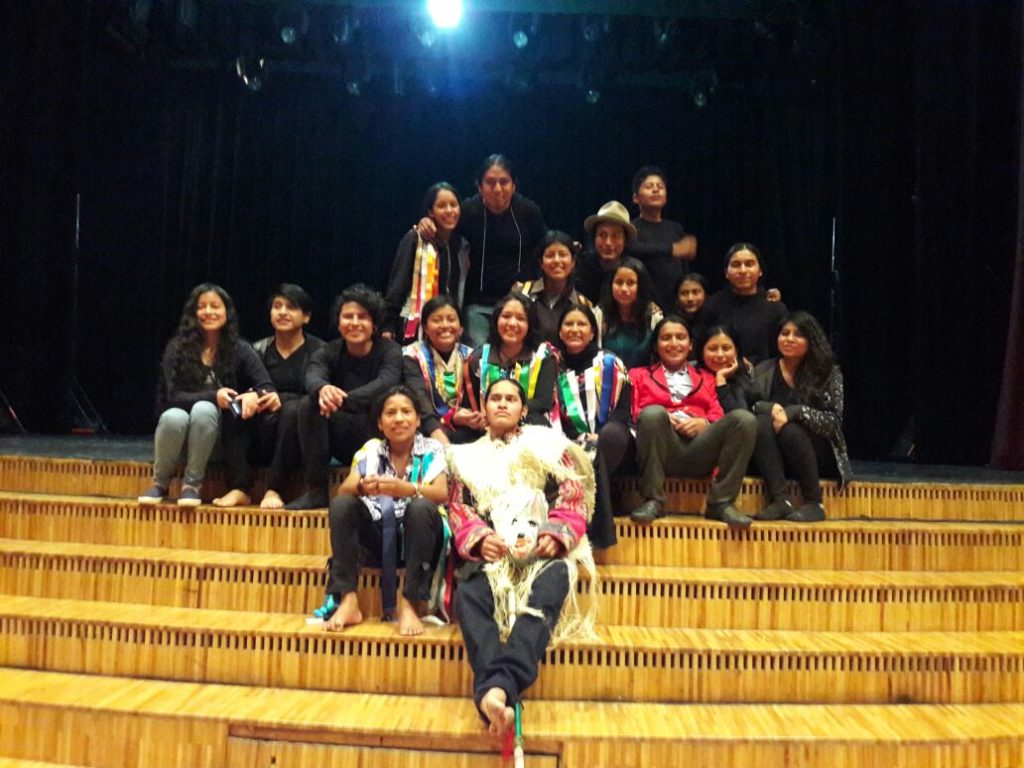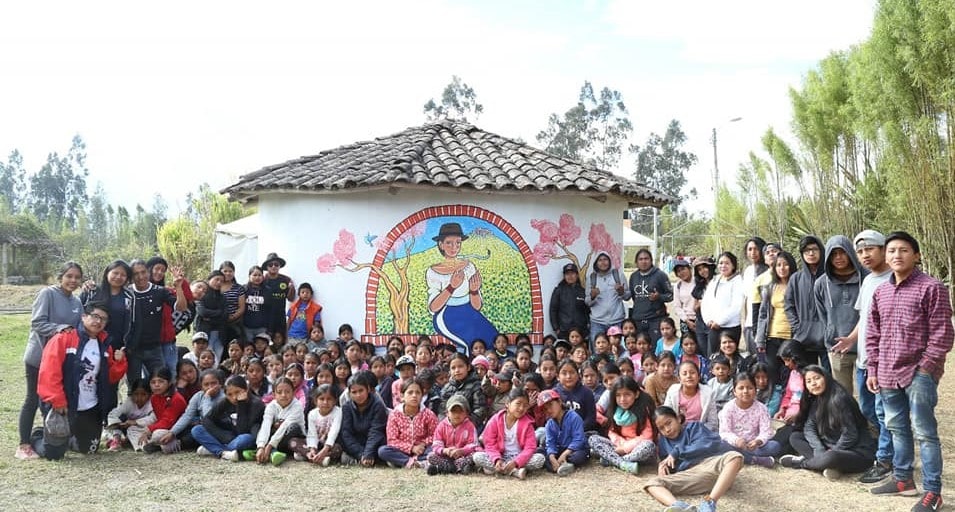Ecuador (Cotacachi)
Kids are running the show in Cotacachi.
There’s a rabbit, a princess, a cowboy. Children dancing in circles, a human donkey rolling on the ground.
It’s another theatre lab run by Ñapash Purina, Cotacachi’s Kichwa youth arts collective. Every week, they meet to rehearse, play, and transform communities.
The group was founded in 2011 to respond to the challenges faced by the Indigenous and young people of Cotacachi, Ecuador. Since then, they have released 2 short films, produced over 80 plays and comedies, and run hundreds of ludic educational youth meetings for the rural communities of the Ecuadorian Andes.

It’s ok to have fun while you change the world.
The inspiration for their plays comes from daily life. In the short 2-part movie Manillas, young Yauri decides to leave school and his family to start work in Colombia, a tragic reality for many Ecuadorian children living in poverty.
The 2018 U.S. Bureau of International Labor Affairs’ report on the Worst Forms of Child Labor in Ecuador found that 168,530 Ecuadorian children engage in child labour, with the majority (82%) working in agriculture. While the government is passing new laws and updating existing provisions to eradicate child labour, Ecuador remains a source, transit, and destination country for adults and minors subjected to human trafficking.
Ñapash Purina’s mission is to raise awareness among young people on issues such as domestic and gender violence, human and drug trafficking, child exploitation, economic instability and job shortage, and more. These are serious themes for young people, but they choose to approach them in an entertaining way, creating safe spaces for kids to learn while playing. Most of their actors are between 12 and 25 years old, and plays are performed in Spanish and Kichwa.
Jenny Morales Arotingo, President of the collective, explains how Ñapash Purina was born out of the necessity to promote empathy and inspire action. “We used to campaign in a more traditional manner, with signs and conferences and school talks — people said that they agreed with us, yet nobody lifted a finger. Papers and lectures took us nowhere but when we started to incorporate the arts, people were suddenly identifying with our work and saying, ‘now I get it’.”

Ñapash Purina’s award-winning plays are performed around the country.
Ludic activities also help Ñapash Purina youth activists open intergenerational communication channels with children who suffer abuse and exploitation. Between a puppet show and a music workshop, kids build trust in their peers and supervisors and the courage to seek help.
Indigenous knowledge and empowerment are crucial to Ñapash Purina (which means ‘walking rapidly’ in Kichwa.) The collective is led by Kichwa members and finds innovative ways to pass down ancestral wisdom. From traditional medicine to music and farming techniques, Kichwa cultural heritage used to be accessed empirically by past generations and is now going lost. Ñapash Purina uses play and collaboration to preserve the wisdom and language that are essential to live on the land.
“Kids learn that they can use oregano when they have a tummy ache but also realise that the knowledge of their elders is invaluable in all aspects of their daily lives.”
During the pandemic, social distancing didn’t allow the collective to organise their signature arts camps that cater to over 120 kids. As children in rural Andean communities with poor or no internet access were left behind by online teaching, Ñapash Purina organised weekly trips called Community Education Brigades (Brigadas de Educación Comunitarias) to help them keep up with their studies — outdoors and distanced. From Maths and English to upcycling trash into musical instruments, school children in 10 Andean communities were able to continue their learning journey through 2020 and 2021.

Ñapash Purina runs summer camps every year.
Jenny says that the collective’s greatest achievement is seeing yesterday’s children turn into today’s activists: “Those running the activities now are the roots nurturing the flowers that are yet to blossom.” The collective becomes an intergenerational bridge helping kids pass down the importance of mutual support and education.
Ñapash Purina’s work is being recognised across the country as plays win awards and the collective is invited to prestigious events like the International Festival of Performing Arts in Loja.
“We won’t stop until the violence against children and women does.”
AtlasAction: If you’d like to make a donation to support Ñapash Purina’s work or have a luminous suggestion for a new play or activity, get in touch via their Facebook page. Passionate about theatre? Find some of our favourite projects on stage.
Project leader
Jenny Morales Arotingo, President
Partners
Support the Atlas
We want the Atlas of the Future media platform and our event to be available to everybody, everywhere for free – always. Fancy helping us spread stories of hope and optimism to create a better tomorrow? For those able, we'd be grateful for any donation.
- Please support the Atlas here
- Thank you!

